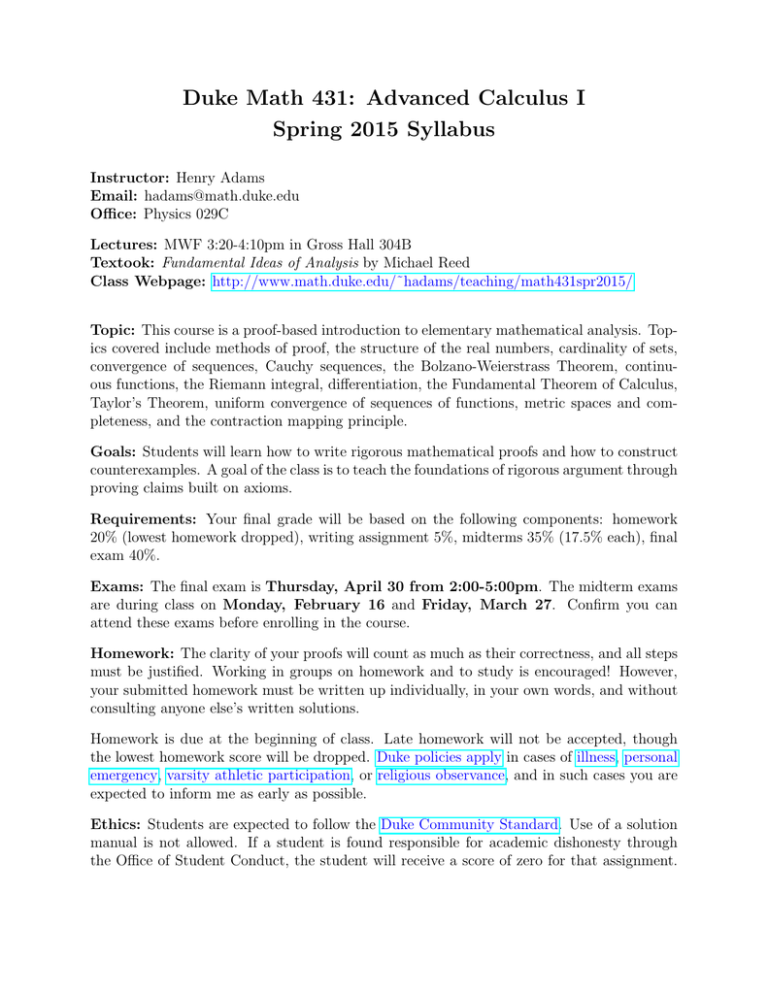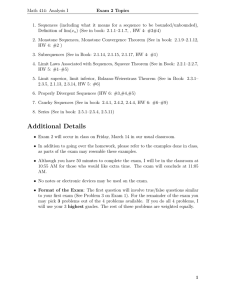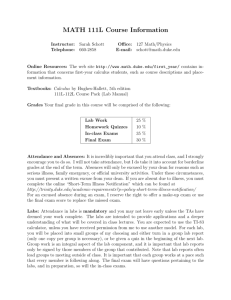Duke Math 431: Advanced Calculus I Spring 2015 Syllabus
advertisement

Duke Math 431: Advanced Calculus I Spring 2015 Syllabus Instructor: Henry Adams Email: hadams@math.duke.edu Office: Physics 029C Lectures: MWF 3:20-4:10pm in Gross Hall 304B Textook: Fundamental Ideas of Analysis by Michael Reed Class Webpage: http://www.math.duke.edu/˜hadams/teaching/math431spr2015/ Topic: This course is a proof-based introduction to elementary mathematical analysis. Topics covered include methods of proof, the structure of the real numbers, cardinality of sets, convergence of sequences, Cauchy sequences, the Bolzano-Weierstrass Theorem, continuous functions, the Riemann integral, differentiation, the Fundamental Theorem of Calculus, Taylor’s Theorem, uniform convergence of sequences of functions, metric spaces and completeness, and the contraction mapping principle. Goals: Students will learn how to write rigorous mathematical proofs and how to construct counterexamples. A goal of the class is to teach the foundations of rigorous argument through proving claims built on axioms. Requirements: Your final grade will be based on the following components: homework 20% (lowest homework dropped), writing assignment 5%, midterms 35% (17.5% each), final exam 40%. Exams: The final exam is Thursday, April 30 from 2:00-5:00pm. The midterm exams are during class on Monday, February 16 and Friday, March 27. Confirm you can attend these exams before enrolling in the course. Homework: The clarity of your proofs will count as much as their correctness, and all steps must be justified. Working in groups on homework and to study is encouraged! However, your submitted homework must be written up individually, in your own words, and without consulting anyone else’s written solutions. Homework is due at the beginning of class. Late homework will not be accepted, though the lowest homework score will be dropped. Duke policies apply in cases of illness, personal emergency, varsity athletic participation, or religious observance, and in such cases you are expected to inform me as early as possible. Ethics: Students are expected to follow the Duke Community Standard. Use of a solution manual is not allowed. If a student is found responsible for academic dishonesty through the Office of Student Conduct, the student will receive a score of zero for that assignment. If a student’s admitted academic dishonesty is resolved directly through a faculty-student resolution agreement approved by the Office of Student Conduct, the terms of that agreement will dictate the grading response to the assignment at issue. 2



